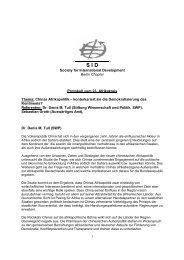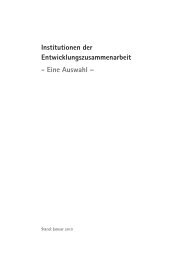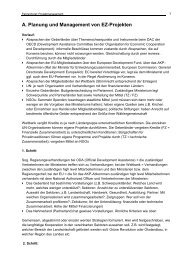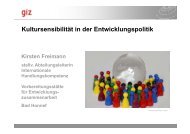Konferenzbericht (PDF-Dokument, 3 MB) - SID
Konferenzbericht (PDF-Dokument, 3 MB) - SID
Konferenzbericht (PDF-Dokument, 3 MB) - SID
Sie wollen auch ein ePaper? Erhöhen Sie die Reichweite Ihrer Titel.
YUMPU macht aus Druck-PDFs automatisch weboptimierte ePaper, die Google liebt.
Wissen wandert<br />
4<br />
auch mit ihrer Hilfe abzufedern, ohne die Situation<br />
der Herkunftsländer aus dem Blick zu verlieren, das<br />
heißt, keinen Brain Drain zu zulassen, sondern im<br />
Gegenteil das Paradigma, dass Migration auch<br />
Chancen und Potenziale für die Herkunftsländer<br />
birgt, mit Leben zu erfüllen?<br />
Sie stimmen mit mir sicher überein, dass eine große<br />
Vielzahl von Aspekten in diese Diskussion und Ausei-<br />
nandersetzung einfließen muss, die ihrerseits umfas-<br />
sende analytische, gesellschaftliche und entwicklungs-<br />
spezifische Kenntnisse benötigen. Es ist darum erfreu-<br />
lich, dass diese Konferenz einen so außerordentlich<br />
hohen Zuspruch findet und sich Experten verschiedener<br />
Länder aus Wissenschaft, Praxis und Verwaltung zu den<br />
unterschiedlichsten Fragen auseinandersetzen können,<br />
die mit Migration und Wissenstransfer zusammenhän-<br />
gen.<br />
Ich wünsche Ihnen an dieser Stelle mutige und interes-<br />
sante Diskussionsbeiträge, neue Gedanken sowie viel-<br />
fältige Möglichkeiten zur Begegnung und zum Aus-<br />
tausch am Rande des Geschehens.<br />
Danke für ihre Aufmerksamkeit!<br />
Staatssekretärin Almuth Nehring-<br />
Venus (anlässlich des Abendempfangs)<br />
Dear ladies and gentlemen,<br />
Thank you for giving me the opportunity to welcome you<br />
for the second time today here in the Berlin Town Hall.<br />
I am sure it has not only been a strenuous but also an<br />
inspiring afternoon for you. We have learned much<br />
about the coherence of migration and mobility, economic<br />
knowledge migrates<br />
development and the transfer of knowledge and “know-<br />
how”. We have learned about creating jobs and prosper-<br />
ity by using the skill, competence and experience which<br />
go along with migration and an intelligent integration<br />
policy. And we have learned that the experience is<br />
global, be it in Canada, Kenya, or Great Britain. This is a<br />
great challenge for all of us who are politically and eco-<br />
nomically responsible. There will be a lot to discuss<br />
about in tomorrows session as well as in tonight‟s infor-<br />
mal get together.<br />
But before you will have the opportunity to enjoy this<br />
after a hard day‟s work let me act as your to-night‟s<br />
town-hall-guide to give you some brief in-formation on<br />
this impressive building and its history.<br />
Whilst in the nineteenth century the crowned heads<br />
resided very close to here nearby the river Spree, the<br />
city councils had to meet in several different places of<br />
the town. Only in the 1860s the city council decided to<br />
allocate funds for the building of a new municipal town<br />
hall. Finally it was built from 1861 to 1869 according to<br />
the plans of the architect Hermann Waesemann. In<br />
contrast to other town hall designs that usually featured<br />
richly ornamented facades and had no tower this very<br />
building was a successful synthesis of stylistic elements<br />
from Northern Italy and the brick work of Northern Ger-<br />
man Hanseatic cities. Because of its red brick facade the<br />
building is called the “Red Town Hall”. Together with the<br />
impressive belfry with a height of 94 metres it makes a<br />
striking contrast to the other surrounding buildings.<br />
The very first government session took place already in<br />
1865 whilst building was still under way. Since that time<br />
and throughout the past 145 years the town hall was<br />
used despite the destruction du-ring the World War II. By<br />
the way: Today we have met in the room which is called<br />
after the Social Democrat Louise Schroeder, who acted<br />
as third mayor of Berlin – and as the first woman in this<br />
office – after World War II in the years 1947 and 1948.







